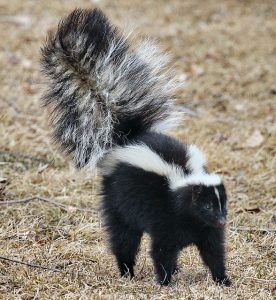Skunk Behavior and Appearance:
The striped skunk is about the size of an adult house cat and its fur is mostly black with white on top of the head and neck. In most animals the white extends down the back, usually separating into two white stripes.
Skunks are nocturnal, hunting at night for insects, grubs, small rodents, snakes, frogs, mushrooms, berries and fruit, pet food, bird food, and garbage. Skunks have a high preference for eggs and, as a result, ground-nesting birds suffer losses.
Breeding usually occurs during February and March for the striped skunk; gestation time is about 9 weeks and litters range from four to six kits. After a few months the kits can be seen following their mother as she makes her nightly rounds in search of food. Skunks do not hibernate, but in regions of colder weather females may congregate in communal dens during the winter.
Skunks often den in burrows, but because they prefer to do as little digging as possible, they will use abandoned burrows dug by groundhogs, rabbits, foxes, or coyotes. If dens are scarce, they will readily use brush piles, hollow logs, and culverts. In urban area, skunks den under decks, porches, sheds or beneath buildings.
There is cause for concern when skunks take up residence in an urban or suburban area because they readily spray pets and are a carrier of rabies, a viral disease transmitted by the bite of an infected animal. Skunks are also carriers of other diseases including leptospirosis, listeriosis, canine distemper, canine hepatitis, Q-fever, tularemia, and trypanosoma.
Skunks are attracted to residential areas by the ready availability of food, water, and shelter. They become a nuisance when they live under porches, decks, garden tool sheds, or homes. They like to feed on ripening berries and fallen fruit and cause many other garden problems by digging while in search of grubs and other insects. Skunks often search for food in lawns by digging small pits or cone-shaped depressions that range from to 3 to 5 inches across.

Trapping:
Skunks can be trapped with a live-catch trap. Individuals who have no experience trapping skunks should hire Crespo’s Wildlife Solutions to remove skunks. Crespo’s Wildlife Solutions technicians have the experience and all the necessary equipment to trap and remove the skunks safely. Our technicians are also much less likely to be sprayed!! It is unlawful to relocate skunks in the state of Pennsylvania.
Exclusion:
The best solution to skunk problems beneath porches, decks, sheds or buildings is to exclude them from the area under mobile homes, porches, and decks. Sorry but skunks do not leave once they have made their home beneath a building. Skunks must be trapped and removed before attempting an exclusion. Exclusions must be installed by an experienced technician from Crespo’s Wildlife Solutions to guarantee that skunks will not gain access under the shed, porch, deck, or home again.
Skunk Odor Removal:
A home remedy formulation that is effective is as follows:
1 quart 3% hydrogen peroxide
1⁄4 cup baking soda
1 teaspoon liquid soap
DO NOT use this mixture on pets. There are commercial neutralizing agents available at your local pet store. Once the hydrogen peroxide is mixed with the baking soda, the mixture is unstable and generates oxygen, and thus cannot be bottled or stored. Oxidation changes the chemical composition of skunk scent to neutralize the smell. The formula will not completely neutralize the smell but works very well.
